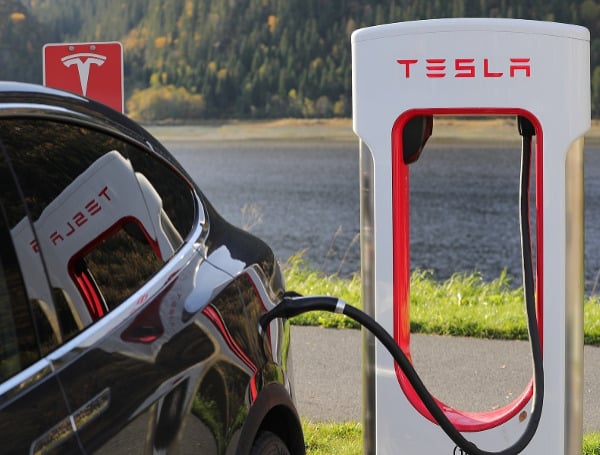The Biden administration proposed a new and ambitious set of fuel economy standards for cars and light-duty trucks Friday, its latest move to prod American consumers towards adopting electric vehicles (EVs).
The National Highway Traffic Safety Administration (NHTSA), a subagency of the Department of Transportation (DOT), unveiled the updated Corporate Average Fuel Economy (CAFE) standards, which would require cars and lighter trucks to improve their respective fuel efficiencies by 2% and 4% starting in 2027, according to a DOT press release announcing the proposal.
The rule would also mandate work vans and pickup trucks to increase their fuel efficiencies by 10% each year, starting in 2030, according to the DOT press release.
In the news: Florida Gov. DeSantis Is Hitting The Reset Button After Months Of Campaign Woes. Will It Work?
If manufacturers fail to meet the stipulations of the proposed CAFE standards, they will have to pay punitive fines to the government, according to the rule’s text.
General Motors voiced its concerns to the Biden administration about prospective new fuel economy standards, telling administration officials in mid-July that such standards could cost American automobile manufacturers as much as $100 billion in 2031 and $300 billion over a five-year timeline, according to Reuters. The administration reportedly dismissed General Motors’s concerns, telling the company that their analysis was incorrect.
“This is an EV mandate and further evidence that the elites want normal people to hoof it or take the bus,” Dan Kish, senior fellow at the Institute for Energy Research, told the Daily Caller News Foundation. “Americans had better wake up, because cars will soon be so expensive that people won’t be able to afford them.”
The NHTSA believes that the proposal will save Americans money at the gas pump while boosting American auto manufacturing and reducing reliance on foreign oil, the press release says.
In the news: Trump Uses State Rural Land Development Budget Veto To Attack Florida Gov. DeSantis
However, the agency has conceded that the rule would saddle the auto manufacturing industry with more than $236 billion in costs, and that the proposal could raise automobile prices by as much as $1,000.
The agency estimates that the “combined benefits” of its proposal will outweigh its costs by more than $18 billion, according to the press release. The NHTSA said that the agency will coordinate with the EPA to minimize costs of compliance with the proposal should it be finalized.
The proposed NHTSA rules are in line with recently-proposed tailpipe emissions standards from the Environmental Protection Agency (EPA), which would effectively require auto manufacturers to have their new fleets be 67% electric vehicles by 2032. The agency also estimates that the rule will save Americans more than $50 billion on fuel costs over the lifetimes of their vehicles.
Neither the DOT nor the White House responded immediately to requests for comment.
Android Users, Click To Download The Free Press App And Never Miss A Story. Follow Us On Facebook and Twitter. Signup for our free newsletter.
We can’t do this without your help; visit our GiveSendGo page and donate any dollar amount; every penny helps
